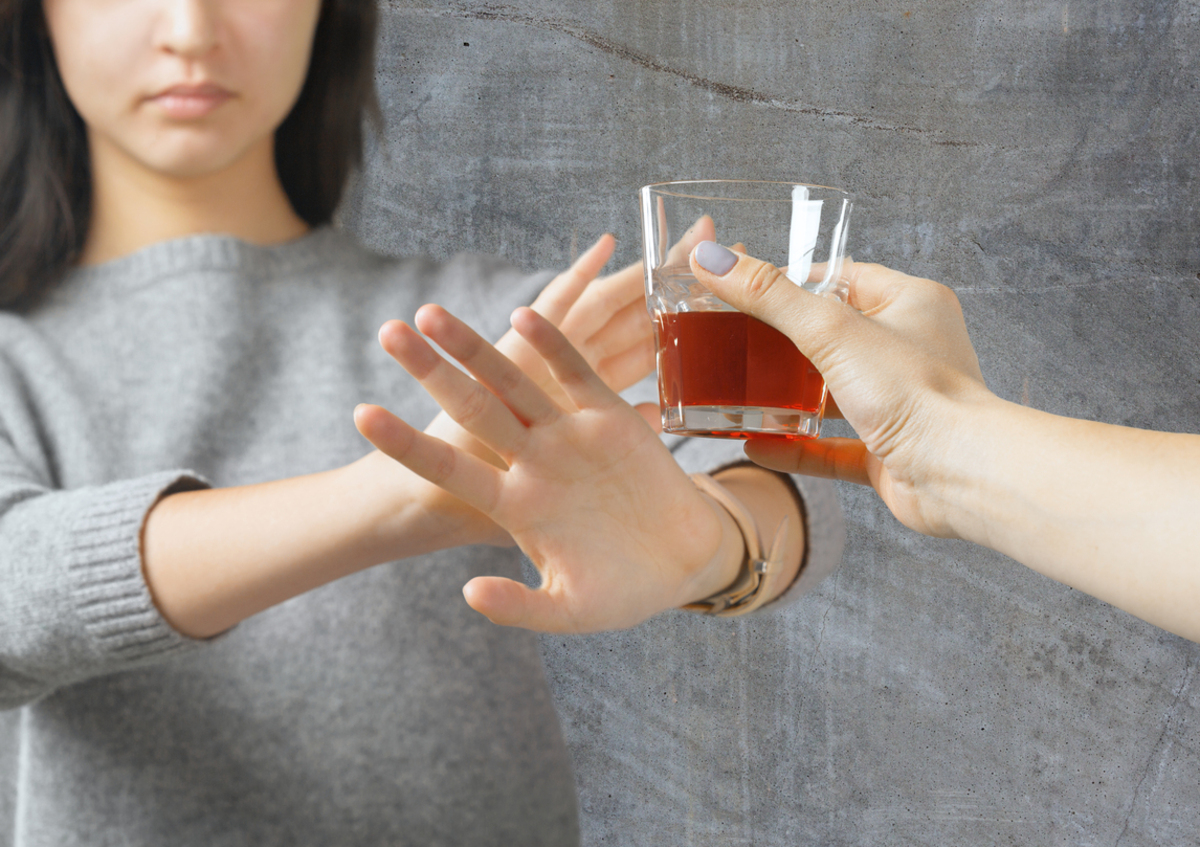Booze is everywhere. Most adults — along with many who aren't — occasionally imbibe, while a good few are heavy or binge drinkers who actively promote drink-fueled socializing. If you're an alcoholic in remission, that's going to be hard. At first, you may avoid venues and events at which people drink altogether, but after you are more solid in your sobriety, you're bound to find yourself in the presence of people who are enjoying alcohol at one point or another.

Sooner or later, one of those people will offer you a drink. Sooner or later, someone will pressure you to drink, or at least probe you about your reasons for declining that drink. The most innocent events, like a business lunch with a new client, or your child's classmate's birthday party, can turn into proverbial minefields in which you try to dodge both alcohol and negative social judgment.
Option 1: Deploy excuses
You may come across situations in which you really don't want to explain that you're not drinking because you have an alcohol use disorder and cannot risk a relapse, but you also don't want to appear to be shaming other people for their own drinking. Perhaps you're having a working dinner with professional associates who may see you differently if they knew you were an alcoholic, for instance, or maybe you're meeting your new partner's parents and really don't want to disclose your past (just yet).
In these situations, socially-acceptable reasons for not drinking that won't raise too many eyebrows could potentially include:
- No thanks, I'm driving.
- No thanks, I've got to get up early.
- Nah, I'm on a diet.
- I'm on medication and my doctor says I can't drink.
- No, I'm trying to get in shape.
- I'm trying to get pregnant/We're trying to get pregnant and I'm dumping the booze in solidarity with my partner.
- I'm taking some time off drinking.
- I'm tired already.
- No thanks, I'd like to be able to remember this conversation later.
- I'm just trying to be healthy.
- I've had enough.
Option 2: Just say no
You don't owe anyone an explanation. Not drinking is a perfectly valid choice that's really none of other people's business, and that holds true whether you're an addict in remission, a teetotaler, or just someone who doesn't fancy a drink right now. As with other more unusual choices — like, in some circles, not being on social media, not attending church, or being a vegetarian — stating where you stand without also explaining why may make some people act a little weirdly, but that's par for the course.
You can try any of these variations of the exact same thing:
- No, thank you.
- No.
- No, I'm good.
- Water/tea/coffee/orange juice/mocktail/etc for me, please.
- Not tonight.
- No, I don't drink.
- I gave up drinking/I no longer drink/I don't do alcohol any more.
Option 3: Pretending to drink alcohol
Some alcoholics in remission may, in situations where everyone else is drinking alcohol, pretend to do the same. If you're hosting a dinner at your house, your orange juice can easily pass for vodka and orange. If you're at a bar and order while others aren't looking, most people will assume that the mocktail you're enjoying contains alcohol. This could get tricky, but it's a thing you can do.
Option 4: Telling people why you're not drinking
The people who are in your life because you want them there — as friends, relatives, or romantic partners — should accept you for who you are: an addict in recovery, who abstains from alcohol.
If you choose this option, there's different ways to go about it. You could tell people you used to drink with that you got sober and want them to support you in your sobriety. You can make jokes about it, along the lines of "I've had enough alcohol for the both of us already, in my lifetime so no thanks", or launch into an AA-style "my name is X, and I'm an alcoholic" introduction. You can tell new people in your life that you've struggled with addiction and are now proudly sober.
What if you then get uncomfortable "oh, I'm so sorry" situations, or people start questioning you about your adventures in addict land? That's up to you. You can cut them off with a light-hearted comment, talk about your experiences getting sober, share your whole life story, or burst into song. Sharing why you don't drink doesn't then oblige you to divulge further details. What and how much you say is totally up to you.
A final word
As the rate of teetotalers — with a wide range of reasons for making the choice not to drink — continues to rise, the number of people who feel completely free to quiz you about your alcohol-free status will hopefully decline. In the meantime, it's totally up to you whether and how you explain why you do not drink alcohol. Remember that though your sobriety is a big deal to you, most people won't really question your life choices that deeply. Changing the topic by asking if anyone read that book, watched that game, or followed that news item, or asking people about themselves, often does the trick, too.
- Photo courtesy of SteadyHealth


Your thoughts on this